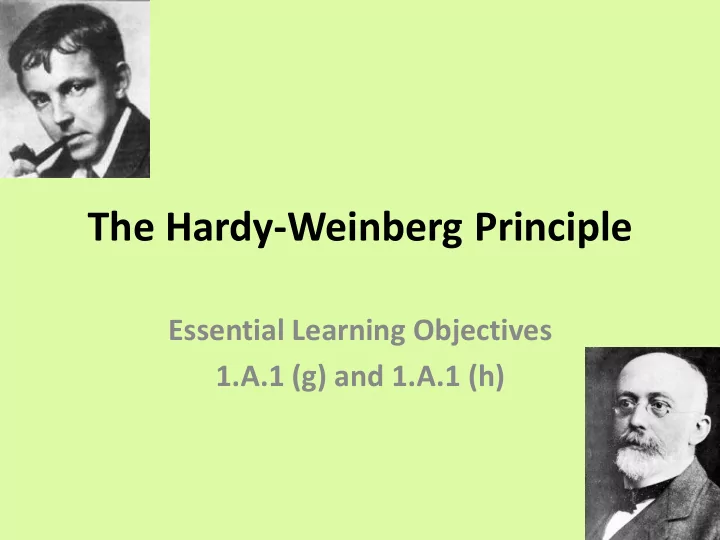

The Hardy-Weinberg Principle Essential Learning Objectives 1.A.1 (g) and 1.A.1 (h)
Evolution of Populations • Individuals do not evolve, but rather, populations evolve • Scientists use mathematical models to study evolutionary changes in allele frequencies within a population
Population and Gene Pool • Population: A group of individuals of the same species that live in the same area and interbreed, producing fertile offspring • Gene Pool: Consists of all copies of every type of allele at every locus in all members of a population
What do you know about the Hardy-Weinberg Principle?
Hardy-Weinberg Principle • States that allele frequencies in a population should remain constant unless one or more factors cause those frequencies to change • Mathematical equation is used to test whether a population is evolving
Hardy-Weinberg and the Punnett Square
Hardy-Weinberg Principle • Used to assess whether natural selection or other factors are causing evolution of a population (a change in the frequency of alleles in a population) • Used to make predictions for populations (like a Punnett square is used to make predictions about individuals)
Five Conditions for a Population to be in Hardy-Weinberg Equilibrium (NOT evolving)
Conditions for Hardy-Weinberg Equilibrium 1. Large population size 2. Absence of migration (gene flow) 3. No mutations 4. Random mating 5. No natural selection Are these conditions realistic?
Application of Hardy-Weinberg • 1 st – Determine what the genetic makeup of a population would be if it were NOT evolving • 2 nd – Compare with the data that we actually observe for the population in subsequent generations • Can be used to identify variables that are influencing evolution of a population (such as natural selection or genetic drift)
What do all those p’s and q’s mean???
Hardy-Weinberg Equations p + q = 1 p 2 + 2pq + q 2 = 1
Hardy-Weinberg Equation p = frequency of the dominant allele in a population q = frequency of the recessive allele in a population
Hardy-Weinberg Equation p 2 = frequency of homozygous dominant individuals 2pq = frequency of heterozygous individuals q 2 = frequency of homozygous recessive individuals
Let’s Try It! • In a pig population, tan pigs (T) are dominant to black pigs (t) What are the possible genotypes for tan pigs and black pigs?
Determine the frequency of the tan allele (p) and the frequency of the black allele (q):
Now determine the frequency of individuals that are homozygous dominant, heterozygous, and homozygous recessive: Tan (TT) = p 2 = p = 0.5 q = 0.5 Tan (Tt) = 2pq = Black (tt) = q 2 =
Sample Problem – Cystic Fibrosis
Sample Problem Cystic fibrosis is a recessive genetic disorder in which a defective gene (CFTR) causes a thick, buildup of mucus in the lungs, pancreas and other organs. 1 in 1700 U.S. Caucasian newborns have cystic fibrosis. Use F for the normal allele which is dominant to the cystic fibrosis allele, f.
Sample Problem p + q = 1 p 2 + 2pq + q 2 = 1
Calculate the allele frequencies (p and q): • p represents the frequency of the recessive allele (f) for cystic fibrosis • q represents the frequency of the dominant allele (F) for normal CFTR
Calculate the genotypic frequencies (p 2 , 2pq, q 2 ):
About the Population (1700) • How many people in the population are carriers (heterozygous) for the cystic fibrosis gene?
Not so bad?
Recommend
More recommend